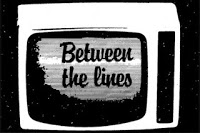Between the Lines: A speculative review
What will TV be like in a socialist society? Will there be TV in a socialist society?  Will viewers be glued to it with the mindless dedication that so many of us are today? There are no categorical answers but, as your devoted reviewer has not watched any telly in the last month, what else is there to do but indulge in some speculation?
Will viewers be glued to it with the mindless dedication that so many of us are today? There are no categorical answers but, as your devoted reviewer has not watched any telly in the last month, what else is there to do but indulge in some speculation?
 Will viewers be glued to it with the mindless dedication that so many of us are today? There are no categorical answers but, as your devoted reviewer has not watched any telly in the last month, what else is there to do but indulge in some speculation?
Will viewers be glued to it with the mindless dedication that so many of us are today? There are no categorical answers but, as your devoted reviewer has not watched any telly in the last month, what else is there to do but indulge in some speculation?
TV today is produced by a small group of people, controlled by an even smaller one. and consumed by those not generally on it (except when called on to pull their trousers down on Game for a Laugh, sit in the Wogan audience or be surprised by Cilia Black dropping in to tell them that they are the best granny in Lancashire). Like most services under capitalism, production and consumption are separated. The producers have a view of the consumers which borders on contempt; the consumers are encouraged to look up to their media informers and entertainers, as if being on TV makes them somehow more wise, more talented, more worthy of attention than their pathetic performances merit. In a socialist society it is hard to imagine that TV will provide a fixed, prepackaged spectacle to be watched unthinkingly by consumers who have no part in its production.
A democratic society will permit free access to the means of communication. There will be no state to monopolise broadcasting — no controlling class — no advertisers to decide what they will finance and what offends them. The right to communicate using the sophisticated means now developed will belong to all members of the community.
TV cannot be national in a society which has rid itself of states and borders. To be sure, there could well be local TV appealing to diverse language and cultural groups which will in all probability flourish in a socialist world. There could also be worldwide TV services, using satellites to link the human family and allowing us to communicate as inhabitants of a single global village.
Being democratic, socialism will not allow TV to be simply a one-way means of communication. When linked to modern information technology, TV could be used to inform viewers and allow them to respond. Socialists are asked how real community democracy could work in a society of millions of people; interactive TV is one practical answer to that question. Also, democratic TV would not transmit images offensive to large numbers of viewers, such as the objectification of women as sex symbols or racist stereotypes of blacks, both of which are key features of the capitalist media. Not only would majority concerns be catered for by socialist TV. but it is hard to imagine that minority views, interests and tastes would not be provided for to an extent undreamed of under capitalism, where output tends to be market-based.
Many of the needs which capitalist TV has to provide for would not be required in socialist TV. Advertising will be superfluous in a society without buying or selling. Would we need to watch soap operas, creating artificial communities and make-believe friendships, in a world of real community? Will people want to see stand-up comedians pandering to fears and prejudices? To what extent would members of a co-operative, socialist society want to bother themselves with the antics of competitive sport7 Will there be such phenomenon as “the news”, which under capitalism is a euphemism for “what we, your informers, consider to be important”?
In a socialist society men and women will be too busy doing things to waste years of their lives watching other people on a screen. Why watch music when you can make it? Why sit and passively observe a studio debate when you could be talking to your friends? Why be stimulated by a screen when you could be stimulated by the real world?
TV in a socialist society would undoubtedly be a forum for education in the broadest sense. Rival ideas could be debated, theories floated, new issues raised, artistic expression given full reign TV could be a medium for sharing ideas, not just about nuclear physics or historical studies but about cooking and rugby tackling or stories worth passing on simply because they are good yarns Those who liked capitalism could show war films and pictures of starving babies, closed-down hospitals and crowded tube trains. They could even have Sir Robin Day to introduce the programmes, just to be sure that everyone knows they are only hair-serious.
Socialism will be what those who establish it want; we can do no more than put forward ideas. Maybe once the madness of the profit system is past, we will all sit down with packets of salted nuts and cans of gassy lager and watch Neighbours and Miami Vice. But then, maybe not.
Steve Coleman
